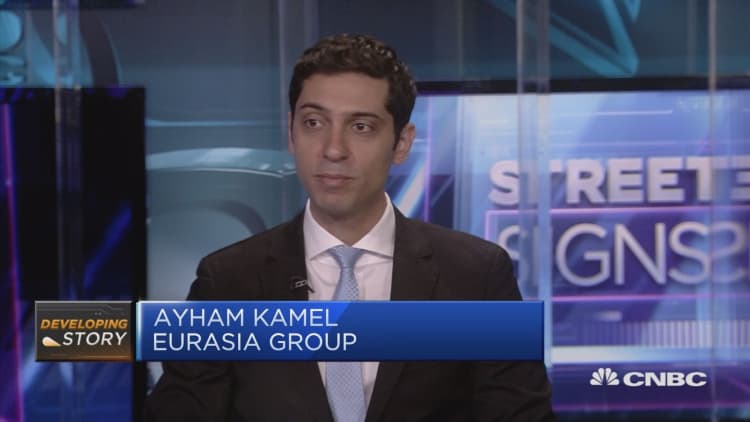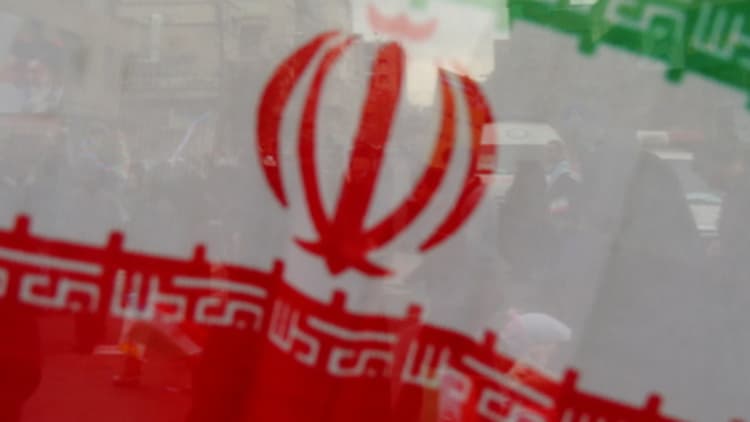A series of rocket exchanges between Iran and Israel along the Syrian border on Thursday may confirm what many feared: The U.S. exit from the Iran nuclear deal will inflame regional rivalries and heighten the risk of open conflict in the Middle East.
Israel launched a deadly attack on Iranian positions in Syria on Thursday, responding to an earlier rocket attack by Iran's forces on the Golan Heights, a border area Israel captured from Syria in 1967. Iran's attack itself followed several strikes by Israel on its bases in Syria, where the Iranians are supporting President Bashar Assad in the nation's long-burning civil war.
The earlier Israeli strikes came both before and after President Donald Trump announced he is withdrawing the United States from the 2015 Iran nuclear deal and restoring wide-ranging sanctions aimed at crippling the Iranian economy. Thursday's rocket exchange came just two days after Trump's announcement.
I very much worry that the antagonists seem to believe that this can be a managed and contained military escalation but military planners thought the same thing in 1914.Helima Croftglobal head of commodity strategy, RBC Capital Markets
Middle East watchers warn that Trump's decision to abandon the nuclear deal emboldens Israel and Saudi Arabia to take a more aggressive stance against Iranian forces and proxies in the region. They say it also marginalizes Iran's political moderates like President Hassan Rouhani and emboldens the nation's hard-line conservatives and the Iranian Revolutionary Guard Corps, an elite military organization loyal to the supreme leader, Ayatollah Ali Khamenei.
"US withdrawal from the JCPOA could shift the balance of power among the Iranian leadership from those who want to keep the deal operational to hardline elements more willing to risk escalation by strengthening support for regional proxies, and who favour economic self-sufficiency and opposed President Rouhani's push for greater engagement with the West," ratings agency Fitch said Thursday, referring to the deal by its official name, the Joint Comprehensive Plan of Action.

The long-standing fear is that open military conflict among the Middle East's dominant players will devolve into a regionwide conflict that drags global powers like the United States and Russia into war. It could also choke off oil supplies from the world's largest energy export hub.
The Israeli-Iranian exchange on Thursday is only the latest flare up in Syria's seven-year war that has drawn in Russia, the United States, Kurdish fighters and Turkey. The delicate balance of alliances and competing interests now risks tipping past the point of no return, according to Helima Croft, global head of commodity strategy at RBC Capital Markets.
"I very much worry that the antagonists seem to believe that this can be a managed and contained military escalation but military planners thought the same thing in 1914," she wrote to CNBC.
On Thursday, the White House condemned the Iranian strikes and defended Israel's counterattack, calling it an act of self-defense. It said Iran's Revolutionary Guard "bears full responsibility for the consequences of its reckless actions."
Beyond Syria, Iran is backing Lebanon's political and militant group Hezbollah, a U.S.-designated terrorist organization and avowed enemy of Israel on the Jewish state's border. The Iranians exercise significant influence over militias in Iraq, and Tehran is widely believed to be arming Houthi rebels in their fight against rivals in Yemen and a Saudi-led coalition that includes the United States.
To be sure, while the nuclear deal limited Iran's program, President Barack Obama's hopes that the accord would pave the way for improved relations proved overly optimistic. Iran has only ramped up its role in foreign conflicts since the deal took effect in 2016.
Now, in the wake of Trump's decision, an "angry Iran is loose in the region," risk consultancy Eurasia Group said in a research note laying out the potential consequences of the U.S. exit.

"In Yemen, Iran will likely encourage its Houthi allies to more aggressively fire missiles at Saudi infrastructure and, more importantly, transfer sophisticated systems to improve missile accuracy," Eurasia Group analysts forecast. "The risk of the deaths of Saudi citizens increases, as does the risk of a tough and escalatory Saudi response."
However, it's the Syrian conflict where Eurasia Group sees the highest risk of volatility.
"As we expected, Israel has ratcheted up airstrikes against Iranian targets, seeking to thwart the establishment of Revolutionary Guard bases throughout Syria," its analysts said.
The heightened political risks could also inflame other tensions tied to Iran that have roiled the Arabian Peninsula, Fitch warned.
It notes that a blockade by Saudi Arabia and the United Arab Emirates on Qatar is largely due to the tiny Gulf nation's ties to Iran. It points out that Oman has been accused of allowing Iran to funnel weapons through its country to neighboring Yemen, and that Bahrain pointed the finger at Tehran-linked terrorism for a domestic oil pipeline attack.
Closely followed trader Art Cashin said geopolitical concerns in the Middle East are now eclipsing those over North Korea, whose leader will meet with Trump on June 12 after talks with South Korea that have begun to defuse a nuclear crisis.
"I would keep an eye on the Middle East a good deal more than North Korea," he told CNBC's "Squawk on the Street" on Thursday.
"I get the feeling as you watch what's going on in North Korea that the Chinese are very involved in making sure that this thing comes off, so if there's going to be a concern, it's going to be the Middle East," said Cashin, director of floor operations at the New York Stock Exchange for UBS.
— CNBC's Patti Domm contributed reporting to this story.
WATCH: Treasury announces new Iran sanctions



